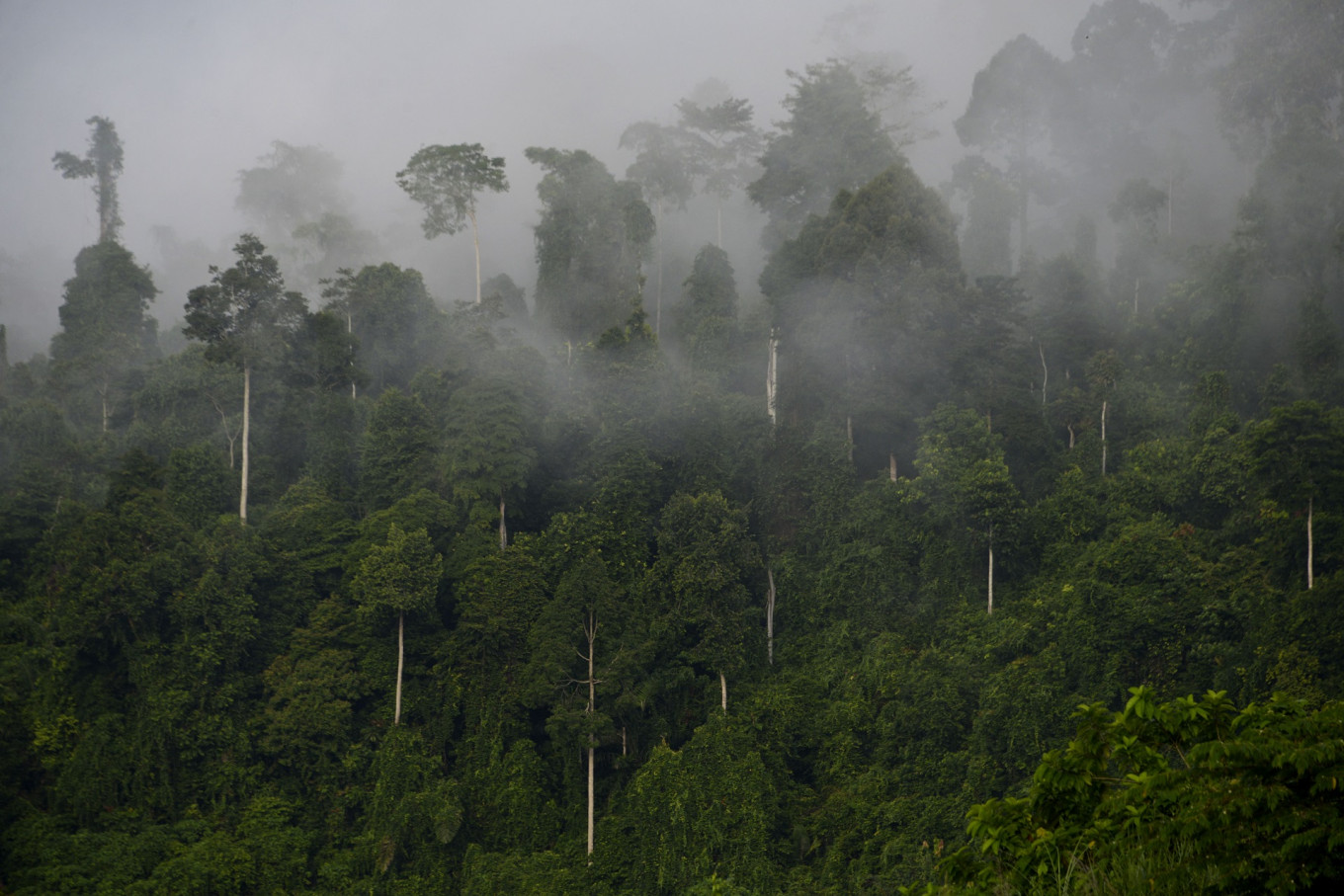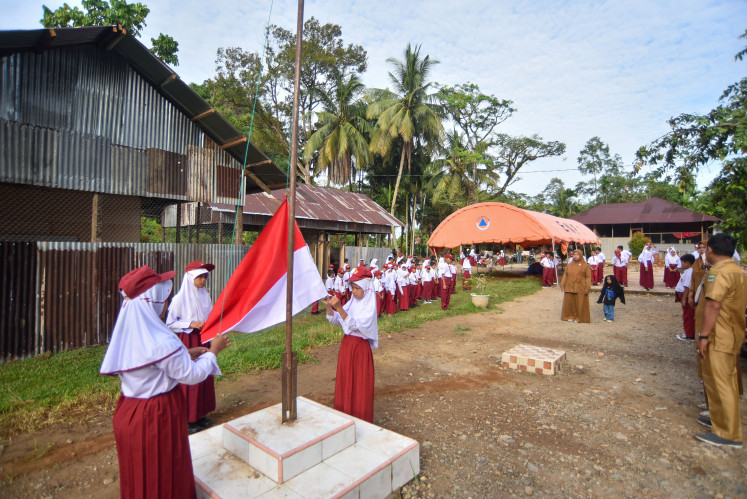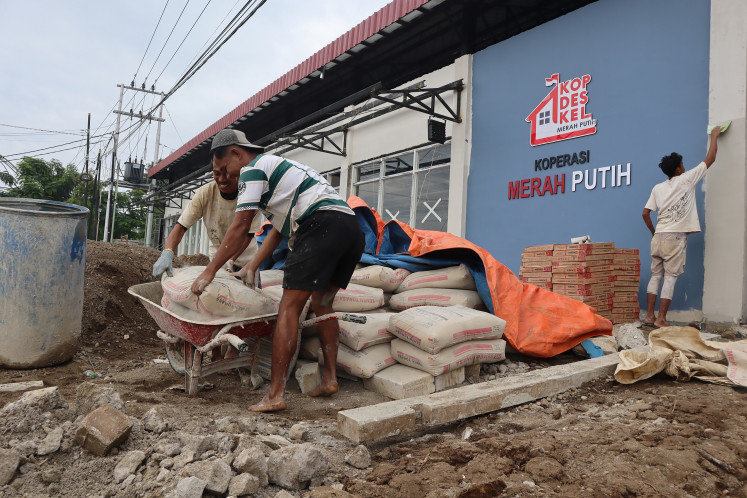Popular Reads
Top Results
Can't find what you're looking for?
View all search resultsPopular Reads
Top Results
Can't find what you're looking for?
View all search resultsIndonesia can lead the world in nature-based solutions for climate change
Indonesia is an ideal place to launch nature-based solutions pilots, given its fast-growing economy and an expanding middle class that is increasingly aware of environmental and social issues.
Change text size
Gift Premium Articles
to Anyone
“We must end the merciless, relentless, senseless war on nature,” so says United Nations Secretary-General António Guterres. He calls 2023 a year of reckoning – a moment for game-changing climate action. “We need disruption,” he adds, “to end the destruction”.
And ending the destruction is something that Indonesia is well placed to do. With its unique resources, Indonesia ranks highly as a country that is able to use nature-based solutions (NBS) to help decarbonization. According to research by McKinsey Nature Analytics, Indonesia has the potential to offset about 1.4 billion metric tonnes of CO2 annually, constituting 2.7 percent of total global emissions, with nature-based solutions.
Ironically, Indonesia also ranks as the world's eighth-largest polluter, contributing two to three percent of greenhouse gas emissions, a position it is determined to shed. At the Conference of Parties 27 (COP27) in Egypt in November 2022, the Indonesian government reiterated the importance of addressing climate change. Prior to COP27, it already announced its ambitious target of achieving a 23-percent reduction in greenhouse gas emissions by 2030 and net-zero emissions by 2060.
Recently, it further stepped up its own commitment toward that goal, promising to unconditionally reduce its own emissions by 31.89 percent and relying on international support to cut the remaining 43.2 percent. Besides the obvious environmental benefits of decarbonization, McKinsey estimates that $100 to $150 billion in economic value could be generated from new business opportunities that arise.
NBS harness the power of living things to capture carbon from the atmosphere and store it. In Indonesia, these include vast forests, wetlands, mangroves, and coral reefs. In fact, Indonesia’s wealth of natural resources amounts to 15 percent of the world’s potential for nature-based solutions, meaning it is prime for scaling. Protecting and expanding these precious resources would help drive sustainable development and help the Indonesian government reach its bold decarbonization targets.
Indonesia is an ideal place to launch NBS pilots, given its fast-growing economy and an expanding middle class that is increasingly aware of environmental and social issues. According to research by Nielsen, more than 60 percent of Indonesian consumers are now interested in buying more environmentally sound products, even if they cost more.
Many companies can also benefit from the cost savings and efficiency gains that result from better resource management, waste reduction, and long-term resilience strategies. The UN estimates that at a global level, every $1 invested ecosystem restoration yields $3 to $75 in economic value. Companies that use natural resources and ecosystem services effectively can optimize operations and reduce their carbon footprints, saving money and boosting long-term sustainability.
To illustrate the potential of Indonesian NBS, McKinsey Nature Analytics studied how protecting fish and coral reefs could contribute to sustainable ecotourism, enhance food security, and safeguard regional biodiversity. The study focused on the marine protected area (MPA) system in Indonesia and neighboring areas, including Timor-Leste, Malaysia, the Solomon Islands, the Philippines, and Papua New Guinea.
The research showed that the MPA system would need to be six times larger to protect 15 percent of the region’s marine life. With this expanded protection, the region's reef-based tourism earnings could increase by $3-6 billion, adding $8 billion annually to Indonesia's GDP, with sufficient investment in infrastructure, such as airports, roads and harbors. The expanded MPA system would also protect 18 percent of the region's oceanic biodiversity, compared to the current 2.9 percent, reducing the threat of over-fishing and enhancing food security.
Indonesian businesses today have little or no access to NBS funding or investment, and some of the relevant regulations are complex and vary by region. Many companies also face challenges in persuading stakeholders, from adjacent industries to community leaders, that climate change can be addressed with natural solutions.
The Sustainable Districts Association of Indonesia reports that a key challenge in NBS implementation is the lack of coordination across stakeholders from the village to the national level.
We believe that new partnerships and alliances can help bridge gaps between stakeholders and increase support for NBS initiatives, but it won’t be easy. Progress will require a wide range of competencies, including scientific expertise, ecological knowledge, business acumen, and public policy experience, all of which are still emerging in the region.
This is why more investments in training and capacity-building will be required for the staff of companies, industry and civic associations, and government bodies. Some may be able to attract talent from more developed markets with experience in establishing NBS. Public and private institutions will need to provide substantial increases in funding and investment to support NBS initiatives.
The returns on investment will be considerable, lasting—and beautiful. Nature-based solutions will help Indonesia slow climate change, protect the nation’s extraordinary biodiversity in the air, on the land and in the sea, and demonstrate the business value of sustainable growth, including improved brand strength and customer loyalty.
With its extraordinary natural resources and a government committed to reducing greenhouse gas emissions, Indonesia can become a leader in the NBS sector, contributing to a more sustainable and resilient future not just across our islands but also around the globe.
***
Vivek Lath is a partner in McKinsey & Company’s Singapore office, and Deepak S Moorthy is an expert associate partner in the Kuala Lumpur office. Nathan J. Ramadhan contributed to the article. The views expressed are personal.











